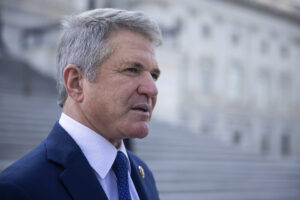Congress
The House Republican risking GOP backlash to save Obamacare subsidies
Among all the troublemaking members House Republican leaders have to deal with, Rep. Jen Kiggans isn’t on their list of problem children. That might be changing.
A former Navy helicopter pilot, nurse practitioner and mother of four, the 54-year-old Virginian is seen in the Republican Conference as something of a model member, hailing from one of the toughest swing districts in the country. She is viewed by her peers as personable and a team player. Of all the places Mike Johnson might have gone on the eve of the 2024 elections, the speaker chose to spend time with Kiggans — a strong show of leadership support for a freshman.
But Kiggans, now in her second term, has decided to stick her neck out on what’s shaping up to be one of the most politically explosive policy fights of the fall: the battle over extending boosted Affordable Care Act insurance subsidies that are due to expire on Dec. 31. Congressional budget forecasters are predicting major premium hikes if the subsidies sunset, which would force millions of people to drop health insurance coverage.
Twelve Republicans and seven Democrats are backing legislation that would enact a one-year extension of the subsidies, which are implemented in the form of enhanced tax credits. Kiggans is the lead sponsor and the GOP face of the effort.
In an interview, she called an extension good politics — and good for her constituents.
“In six weeks or so, people will get a notice that their health care premiums are going to go up by thousands of dollars,” said Kiggans. “And at the end of the year … for people that either have this type of insurance and work in small businesses, are self-employed, you know, I worry about their access to health care.”
The latest Capitol Hill clash over preserving health care policies enacted by Democrats, however, is shaping up to be a central battle in government funding negotiations ahead of a Sept. 30 shutdown deadline — and driving a rift inside the GOP in ways that echo party infighting over scaling back Medicaid in President Donald Trump’s “big, beautiful bill.” The dispute is also now pitting centrists like Kiggans against conservatives who have fought for years to undo the Affordable Care Act. And it carries major political stakes for Republicans as they gear up for their fight to keep control of the House next year.
The Democrats’ 2010 health law first provided for tax credits to help make premiums more affordable under the new insurance plans. But the 2021 Covid relief package supercharged those credits, making them more generous for people with lower incomes but also accessible to individuals making up to $600,000 a year. It’s that “enhanced” version of the credits that will expire at the end of the 2025 without congressional action.
One senior House Republican, granted anonymity to share their private view of Kiggans’ support for the subsidies, suggested she’ll be given latitude by her colleagues and leadership to follow her instincts on the credits’ fate: “Kiggans does her homework, and she understands her base or constituency and what needs to be done.”
Still, she’s finding herself caught in the middle of warring factions that could test the positive relationships she’s built during her short time in office, while also putting her political future at risk.
She’s going up against a swath of hard-liners who in the coming days plan to ramp up their coordinated campaign against any extension, in part by arguing that the subsidies are used to cover abortions. Conservatives also say the tax credits are too expensive, and they are generally loath to support any policy tied to the Affordable Care Act.
Rep. Eric Burlison (R-Mo.), a member of the House Freedom Caucus, said in an interview Thursday it would be “awful” if Johnson capitulates to demands from moderates like Kiggans to extend the enhanced ACA credits. Rep. Andy Harris (R-Md.), chair of the hard-line contingent, called the subsidies “free giveaways to insurance companies.”
Mindful of the intraparty fissures around this issue, Johnson has so far been careful not to say whether he endorses an extension, and certainly isn’t tying it to a government funding package needed to avert a shutdown before Oct. 1. Republicans who support Kiggans’ crusade privately believe their best bet for victory is securing the extension in a second funding measure at the end of the year, but Democrats are making this linkage a condition of their support for the immediate stopgap spending measure.
“There’s a range of opinion on it,” Johnson said in a brief interview earlier this month. “It doesn’t expire until the end of the year, so we have time to figure it out.”
Kiggans has a track record of breaking with her party on some big issues but not tanking legislation to gain leverage. For instance, she was among the most vocal critics of the GOP megabill’s targeting of clean energy tax credits that are benefitting her district, but she still voted for the new law. She said this past week she didn’t plan to shut down the government to get her way on the ACA tax credits, either.
“I represent a big military district,” she explained, “and people who rely on those federal paychecks.”
But Democrats, who see Kiggans’ seat as a prime pick-up opportunity in 2026, accuse her of being duplicitous.
“Jen Kiggans cast a decisive vote to rip away health care from 350,000 Virginians, and just this week three health care clinics in the Commonwealth were forced to shutter as a direct result of her vote,” said Eli Cousin, a spokesperson for the Democratic Congressional Campaign Committee, in a statement that referred to Kiggans’ vote for the GOP megabill.
“Kiggans wants to trick voters before she is up for reelection, then sell them out right after,” Cousin added. “She is everything wrong with Washington politicians.”
Kiggans is working to thread the needle. She said she agrees with fellow Republicans that the credits are expensive and need to expire eventually. But she also made the case that her party needs to create “a longer runway” to discuss how to soften the blow of phasing out the enhanced credits completely.
“It’s time to end these tax credits, but when it comes to health care, it’s not quite as easy as letting them expire, especially when it’s something at the end of the calendar year,” Kiggans said. “And I’m not alone. There’s people on both sides of the aisle that feel the same way. And these are common-sense members of Congress that care about health care.”
Democratic co-sponsors of her bill include Reps. Jared Golden of Maine and Marie Gluesenkamp Perez of Washington, the co-chairs of the fiscally conservative Blue Dog Coalition. Among the Republican supporters are Reps. David Valadao of California, Juan Ciscomani of Arizona and Mike Lawler of New York — some of the most endangered incumbents of the election cycle.
But senior House Republicans have questioned the strategy Kiggans and her group is pursuing, according to three people granted anonymity to speak candidly about private conversations. These Republicans are, in particular, critical of the rollout of her bill, which did not include any of the reforms Kiggans acknowledged are needed to the larger program.
This “clean” extension, many in the GOP feel, could put Republicans in a tough spot, including Kiggans’ fellow frontliners who have not signed onto her effort.
“Full credits with high wage earners is too far for most Republicans,” said one of the senior House GOP Republicans, referring to how Kiggans’ bill would fully extend the premium tax credit for one year rather than to put new income limits on an extension, as some Republicans have suggested doing.
Some vulnerable GOP incumbents who haven’t yet signed onto Kiggans’ bill also acknowledged an income cap and other reforms will likely be part of any compromise.
“We want to make sure that affordability is maintained as best as possible for people,” Rep. Ryan Mackenzie (R-Pa.) said in an interview, while adding, “I know there are some concerns that some have expressed about high-income individuals being eligible.”
Kiggans said the value of her one-year extension bill is that it would, indeed, force a discussion about how to either continue the subsidies responsibly or wind them down in a thoughtful way. She advocated for a scenario where members could come to the table and hash out a long-term solution, recalling the consensus-building exercise that took place around making changes to Medicaid as part of the megabill.
“That took a lot of meetings, a lot of late nights, a lot of discussions with people who happen to have skin in the game,” said Kiggans.
There are plenty of Republicans who believe Kiggans should stay the course and leadership should follow, warning an expiration of the premium tax credits could cost the GOP dearly in the midterms.
A July poll by veteran GOP pollster Tony Fabrizio found that Republicans have an “opportunity to overcome a current generic ballot deficit” in 2026 if they allow an extension. Letting them expire, according to that same survey, would cause an expected three-point deficit for a generic Republican to plunge to 15.
Rep. Richard Hudson of North Carolina, the chair of the National Republican Congressional Committee, said that “everybody’s voice is being heard” on whether to extend the ACA subsidies.
“I think we’re having internal discussions now about, kind of, where we are as a conference and what’s feasible and what’s not feasible,” Hudson said in a brief interview last week. “I’ll wait and see how that develops before I say anything publicly.”
Kiggans insisted her party can’t afford to wait.
“Republicans need to lead on this issue,” she said. “And we can.”
Cassandra Dumay and Mia McCarthy contributed to this report.
Congress
Capitol agenda: Republicans to reveal funding bill, testing Democrats in shutdown showdown
Republicans are getting ready to reveal a short-term bill to fund the government through Nov. 20, despite Democrats’ demands for buy-in in any legislation to avert a shutdown.
Text of the continuing resolution is expected to be released as early as Monday morning, according to three Republicans. Here’s the latest:
The timeline: House Republicans want to put the CR on the floor this week. That still likely won’t give the Senate enough time to schedule a vote before next week’s recess in observance of Rosh Hashanah, however, leaving Congress with just days left to act before the Sept. 30 deadline.
The holdup: House Republican leaders are working to attach increased lawmaker security funding to the stopgap bill in the wake of Charlie Kirk’s assassination. Speaker Mike Johnson told Fox on Sunday morning that all options are on the table, and three people tell Meredith it’s the final piece to resolve. Sen. Lindsey Graham (R-S.C.) has also been doing some last-minute lobbying for his bipartisan Russia sanctions bill to hitch a ride on the CR. But two people granted anonymity to discuss the views of GOP leadership say it’s not going in without President Donald Trump’s explicit and public backing.
The big problem: Democrats in both chambers insist they will not accept any funding agreement without bipartisan talks, and Republicans are going it alone. They also say they need the CR to include an extension of enhanced tax credits for Affordable Care Act insurance premiums, which are due to expire at the end of the year. Republicans are still figuring out how to proceed on that one.
A key question is how Democrats will vote in the Senate, where Republicans won’t be able to move government funding legislation without support across the aisle. Many Republicans are banking on a do-over of what happened in March, when Senate Minority Leader Chuck Schumer shored up support for a procedural vote on a shutdown-averting package negotiated only among the GOP.
But Schumer got an earful from his party’s base about not fighting harder for a better deal, and he’s currently warning his GOP colleagues that a CR without the ACA credit extension is a deal-breaker.
“If Republicans follow Donald Trump’s orders to not even bother dealing with Democrats they will be single handedly putting our country on the path toward a shutdown,” said a Schumer spokesperson Sunday night.
Some Senate Democrats have suggested they could support a “clean” stopgap funding bill now if it’s intended to buy more time toward negotiating an ACA subsidies extension later. But many of them are holding back on opining without first knowing what Republicans are officially offering.
“I’m not going to comment until I see what actually happens. It’s all speculation right now,” Sen. Gary Peters (D-Mich.) told Blue Light News.
What else we’re watching:
— Senate rules change: This week Majority Leader John Thune will steer Senate Republicans toward finalizing their rules change to allow most executive branch nominees to be confirmed in batches. It will put Republicans on track to confirm their first tranche of 48 nominees including Kimberly Guilfoyle and Callista Gingrich to be ambassadors to Greece and Switzerland, respectively.
— DC bills get House vote: It’s shaping up to be a major week for the District of Columbia on Capitol Hill. A slate of bills will come to the House floor that would override laws put in place by the D.C. government, and the capital city’s top three leaders will appear before a key committee. This comes after Trump’s month-long federal takeover of D.C.’s police department and as the National Guard continues to patrol the city’s streets. Republicans remain intent on casting Washington as an example of a Democratic-led jurisdiction overrun by violent crime.
— Miran confirmation: The Senate is poised to confirm Stephen Miran Monday evening to the Federal Reserve, just around a month after the Trump ally was first nominated. The chamber has moved at blinding speed to install Miran so he can be in seat when the Fed kicks off its September meeting Tuesday, at which time the central bank is widely expected to cut interest rates.
Meredith Lee Hill, Jordain Carney and Hailey Fuchs contributed to this report.
Congress
Texas Rep. McCaul says he won’t seek reelection
Saying he was seeking “a new challenge,” Rep. Michael McCaul (R-Texas) said Sunday he won’t run for reelection in 2026.
Speaking on ABC’s “This Week,” McCaul told host Martha Raddatz: “I’m going to serve the remainder of my term. But I’m looking for a new challenge in the same space that would be national security, foreign policy, but just in a different realm. “
McCaul, the former chair of the Homeland Security and Foreign Relations Committee, added: “I want to continue to serve the people of this country in national security and foreign policy and do what I’ve done the last two decades — make America stronger and the world safer.”
Raddatz responded: “Well, that’s a good plan. They’ll miss you on Blue Light News. You got a ways to go. Thanks for joining us this morning.”
McCaul subsequently posted the clip on X and added: “It has been the honor of a lifetime to represent the people of central Texas and to chair the prestigious Homeland Security and Foreign Affairs Committees. My father’s service in World War II inspired me to pursue a life of public service, with a focus on defending our great nation against global threats, and I have been proud to carry out that mission in Congress for more than two decades. I am ready for a new challenge in 2027 and look forward to continuing to serve my country in the national security and foreign policy realm.”
McCaul, age 63, was first elected in 2004. He drew 63.6 percent of the vote in his last reelection race in 2024.
Most of McCaul’s ABC appearance was spent discussing foreign policy and current international crises. He said, for instance, that he was worried that the deployment of Russian drones over Poland’s airspace last week represented an “escalation” of tensions in Europe.
“We’ve never seen anything like this in recent times,” he said. “And so, what I’m concerned about is that the escalation here and the temperature rising, we got to be very careful not to be on the precipice of a World War III.”
McCaul also said he expects Russian President Vladimir Putin to continue to cause trouble, at least to a point.
“I think he’ll continue to be provocative and saber-rattle. I don’t think he would use nuclear weapons. I think China put a red line,” McCaul told Raddatz.
Congress
Trump policies to ‘drag’ on economic growth, CBO predicts, offsetting megabill gains
Republicans claim the GOP megabill, coupled with President Donald Trump’s tariff and immigration policies, will “unleash economic growth.” Congress’ nonpartisan scorekeeper says not so much.
The Congressional Budget Office’s new economic estimates released Friday predict that over the next three years, policies implemented this year by Trump and the Republican-led Congress will have little effect on growth before the 2028 election.
That’s because Trump’s tariff policies and crackdown on immigration are estimated to cool the economy this year, more than outweighing any growth spurred by the tax and spending package Republicans turned into law this summer.
By next year, CBO expects that balance to change some, as the effects of the megabill begin to outweigh the negative economic impact of tariffs and immigration policy, pushing GDP growth higher than previously predicted.
Then, in the lead-up to the 2028 presidential election, the combination of the GOP policies are estimated to be mostly a wash for economic growth.
In 2027 and 2028, the GOP megabill’s boost to demand will wane as reduced immigration hits the labor force, acting “as a drag on growth,” the budget office predicts. Higher tariffs, however, will partially offset that hit, driving increased domestic production.
The result: As voters head to the polls in November 2028, the level of real GDP will be just 0.1 percent higher than predicted before Trump took office.
-
Uncategorized10 months ago
Bob Good to step down as Freedom Caucus chair this week
-

 The Josh Fourrier Show10 months ago
The Josh Fourrier Show10 months agoDOOMSDAY: Trump won, now what?
-

 Politics10 months ago
Politics10 months agoWhat 7 political experts will be watching at Tuesday’s debate
-

 Politics7 months ago
Politics7 months agoFormer ‘Squad’ members launching ‘Bowman and Bush’ YouTube show
-

 Politics10 months ago
Politics10 months agoHow Republicans could foil Harris’ Supreme Court plans if she’s elected
-

 The Dictatorship7 months ago
The Dictatorship7 months agoPete Hegseth’s tenure at the Pentagon goes from bad to worse
-

 The Dictatorship7 months ago
The Dictatorship7 months agoLuigi Mangione acknowledges public support in first official statement since arrest
-
Economy10 months ago
Fed moves to protect weakening job market with bold rate cut







